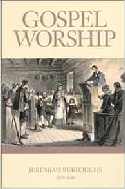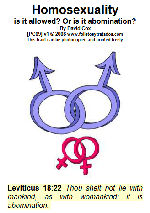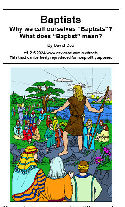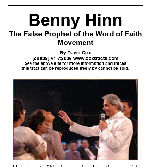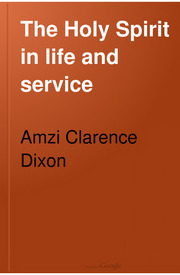Contents
- 1 God’s People are to be Free from Covetousness
God’s People are to be Free from Covetousness
Covetousness in the Ministry
By David Cox
Col 3:5 Mortify therefore your members which are upon the earth; fornication, uncleanness, inordinate affection, evil concupiscence, and covetousness, which is idolatry:
If we understand the true man of God’s mental attitude towards covetousness, then discerning false prophets becomes greatly easier. Most false prophets have an agenda, and this agenda is by far and widely seen in his covetousness, the obtaining of riches for himself. There are other agendas like sexual control over others, or even fame and glory, or control over the brethren, but this one element of covetousness is very strong in most false prophets.
See Tag: http://www.theologicalsystems.com/tag/money-and-the-minister/
To desire as in covetousness, we need to understand how this works. Desiring is just a first step of many steps. People do not “just desire”. Desire leads the actions and strength of a person’s life to obtain. From there consumption takes over. You desire something to eat. You look at what is available. You find a way to obtain it, but you never let it stay at that point. There is always consumption, or being a consumer involved in the end. People consume, and this is where all of the covetousness goes. It goes to their appetite, they belly.
Rom 16:17 Now I beseech you, brethren, mark them which cause divisions and offences contrary to the doctrine which ye have learned; and avoid them. Rom 16:18 For they that are such serve not our Lord Jesus Christ, but their own belly; and by good words and fair speeches deceive the hearts of the simple.
Phil 3:19 Whose end is destruction, whose God is their belly, and whose glory is in their shame, who mind earthly things.)
People exalt their own pleasure as being worthy of all their life’s energy and strength. This is where the covetousness comes to root. People want to consume luxury and excess good, and this is their god. They are experience oriented people, and they do anything to arrange great and pleasurable experiences for themselves. These are the vacation people, the people with expensive and excessive toys in order “enjoy life”. Work and service seem like an unpleasant requirement of them enjoying life, and they really seek to by-pass the hard, sweaty labor of Genesis 3:19.
Note: “Covetousness” in Scripture is simply a very, very strong desire. We should desire good things, but this word has with it a more sinister meaning, or in other words the word is normally used in English for incorrect strong desires. There are places in Scripture where the word (in Hebrew and Greek) is used in a good sense, a very strong desire for something good and commendable. This study looks at the word in its bad sense.
Introduction
The extreme desires for things is a sin, like many other sins. This has an unscriptural basis. When a person is saved, he “confesses”. Confession comes from the Greek word, homologeo which means to say the same thing as another person. A very large part of salvation is to say what God says. So let me break this down here.
Firstly, if we suddenly “say what God says” on matters, this implies correctly that what we were saying before that was flawed, in error, wrong, insufficient, off base, etc. There is a sinfulness or defectiveness within us and our professing (declaring) that is abandoned.
Secondly, there is a correct position, which God provides for us, that we adhere to, and proclaim. It is not based on our logic, not really our understanding. It is the infallible God that provides us with what is correct. Here we see inspiration and inerrancy of the means of communication (the Bible).
Thirdly, there is a change of life. In other words, a confessing of God’s position cannot be only in word, but rather it must be something that we have totally accepted in our own person, so that whatever God says, we are now embracing, believing, adhering to, etc. This implies faith, which is a great deal different from just saying something, playing around with it, and it implies that it is now at the seat of a person’s soul, and he fully believes that thing.
Fourthly, this confession is a push by the person. This concept evangelism is something that the person is declaring against all other opposing or competing concepts. Therefore it is important to him, and he cannot remain silent on the declaration in the presence or with examples of contradictory declarations.
So taking the same position that God has and says about a thing, and espousing that, believing that, championing that by defending it, that is “confessing”.
Covetousness is Mutually Exclusive with being Saved
Eph 5:3 But fornication, and all uncleanness, or covetousness, let it not be once named among you, as becometh saints;
1Cor 6:9 Know ye not that the unrighteous shall not inherit the kingdom of God? Be not deceived: neither fornicators, nor… 1Cor 6:10 Nor thieves, nor covetous, nor drunkards, nor revilers, nor extortioners, shall inherit the kingdom of God.
While the saints fall into sin, and we fight against this by rebuking these sins, and exhorting them to follow righteousness, this sin of covetousness goes to the heart of the matter in an evil and wicked way. God is love, and love is showing most often by giving in some way. When a person becomes stingy, has sticky fingers, seeks to take and keep and make that the very fiber of his soul, he denounces Christianity.
Matt 13:22 He also that received seed among the thorns is he that heareth the word; and the care of this world, and the deceitfulness of riches, choke the word, and he becometh unfruitful. Matt 13:23 But he that received seed into the good ground is he that heareth the word, and understandeth it; which also beareth fruit, and bringeth forth, some an hundredfold, some sixty, some thirty.
More Posts on Covetousness
- The difference between Abuse and Mistakes
- Pastoral Covetousness NT
- Ministerial Requirement Not Covetous
- FP: Catching the False Prophet with his hand in the Cookie Jar
- Discerning between a False and True Christianity
- Covetousness is Idolatry
- Covetousness doesn’t mix with God’s Work
- Catholic Fleecing the Lambs
- Biblical Overview of Covetousness
A person who has the deceitfulness of riches choke his soul; he cannot be saved. There is a character to a person who eyes and desires “things” and money. This cannot sit comfortably with Jesus Christ on the throne of his life.
Matt 6:19 Lay not up for yourselves treasures upon earth, where moth and rust doth corrupt, and where thieves break through and steal: Matt 6:20 But lay up for yourselves treasures in heaven, where neither moth nor rust doth corrupt, and where thieves do not break through nor steal:
A saved man has caught a glimpse of heaven. He has put his eye on heaven, and nothing else is of great interest to him. His interests and the pursuit of his life is in that place and the person of God in the center of that place.
Matt 6:21 For where your treasure is, there will your heart be also. Matt 6:22 The light of the body is the eye: if therefore thine eye be single, thy whole body shall be full of light. Matt 6:23 But if thine eye be evil, thy whole body shall be full of darkness. If therefore the light that is in thee be darkness, how great is that darkness!
God declares that nature is consistent, how He has made the man, this is how it works. Men set their affection on some “thing”. That thing, whether it is earthly or heavenly consumes them. If that thing is good and wholesome in God’s sight, then his whole body is good. But if it is failed, then nothing is good in his soul.
Matt 6:24 No man can serve two masters: for either he will hate the one, and love the other; or else he will hold to the one, and despise the other. Ye cannot serve God and mammon.
More Posts on Money and the Minister
Mammon here is riches, possessions. That one thing that you set your vision and goals in your life on obtaining, pleasing, ordering your life under that thing, that is what is important to be careful in the setting. Is it God? or Is it riches? (Covetousness)
Matt 6:25 Therefore I say unto you, Take no thought for your life, what ye shall eat, or what ye shall drink; nor yet for your body, what ye shall put on. Is not the life more than meat, and the body than raiment?
People excuse their covetousness by saying that the necessities of life demand that they focus on “things”, “possessions”, and by course, “money”. If they don’t have money, they cannot exist. True. But Jesus directs our thoughts to nature, God provides for all his creatures, and it is only when a creature breaks with what God wants of him that the creature lacks.
Matt 6:26 Behold the fowls of the air: for they sow not, neither do they reap, nor gather into barns; yet your heavenly Father feedeth them. Are ye not much better than they? Matt 6:27 Which of you by taking thought can add one cubit unto his stature? Matt 6:28 And why take ye thought for raiment? Consider the lilies of the field, how they grow; they toil not, neither do they spin: Matt 6:29 And yet I say unto you, That even Solomon in all his glory was not arrayed like one of these. Matt 6:30 Wherefore, if God so clothe the grass of the field, which to day is, and to morrow is cast into the oven, shall he not much more clothe you, O ye of little faith?
The clear teaching is that we are not to worry about money things, because God provides, and this is a matter of faith in God.
Matt 6:31 Therefore take no thought, saying, What shall we eat? or, What shall we drink? or, Wherewithal shall we be clothed? Matt 6:32 (For after all these things do the Gentiles seek:) for your heavenly Father knoweth that ye have need of all these things.
The unsaved typically worry about the necessities of life, and especially money. We have a special relationship with God, and by means of this relationship (salvation), we communicate our needs and desires to God.
More articles of Interest
The Minister’s Just Salary
A Minister’s Healthy Mindset
Worldliness is our Enemy
Elements of “Free from Covetousness”
Ministers: Rejecting Riches
Note that God already knows them and is working on always providing them to us. But also note that life and its needs is really a by-product of our relationship with God. Things go wrong when we are not in a right relationship with God.
Matt 6:33 But seek ye first the kingdom of God, and his righteousness; and all these things shall be added unto you. Matt 6:34 Take therefore no thought for the morrow: for the morrow shall take thought for the things of itself. Sufficient unto the day is the evil thereof.
First of all, worry is condemned. Secondly, our central focus should not be on the economic, but on the spiritual.
Heb 13:5 Let your conversation be without covetousness; and be content with such things as ye have: for he hath said, I will never leave thee, nor forsake thee. Heb 13:6 So that we may boldly say, The Lord is my helper, and I will not fear what man shall do unto me.
Covetousness and the hoarding up of riches undercut the fact that God provides for us on a daily basis. If that is true, and God will never forsake us, then a wild craziness for having a lot of money (riches) goes against your belief in God. This is why riches and salvation are mutually exclusive because riches only come when the person expends much time, energy, life resources, and priorities on getting them. Doing that in itself makes the riches a god in your life.
Ps 73:25 Whom have I in heaven but thee? and there is none upon earth that I desire beside thee.
When a person seeks satisfaction, comfort, trust on temporal things, he is denying his trust in God. The two are mutually exclusive. Christians trust God, the unsaved trust things, and their own ability. Instead of believing and living in God’s promises of provision, the person sets riches, money, possessions, businesses, real estate, position, fame, etc. as their fundamental position in life, and that achieving those things becomes their god, the god that they confide in for stability and for life sustenance.
More articles of Interest
Covetousness is mistreating God’s Creation
The things of this world are not used as God has intended them, but they become an end in and of themselves, rather than a means. “Things” are to sustain life until we enter eternity. But “things” are not to become the end in themselves of our life. These things are idols when they are used inordinately. Covetousness is a distract from true worship of God, but it is also an exaltation to godhood or deity (our ultimate goal and desire which because God is a person, it is loving this God). Things take the place of God in our life. This is easily seen by analyzing the priorities of riches and possessions versus the priorities of spiritual things in our life. Money and gain eventually crowd out God first from things like participation in God’s work, no time for prayer, no time for witnessing. Then it will attack the very worship of God on the Lord’s day, and soon the person will be doing other “more important” things on Sunday. Although many will play on the border of this, and come and be irregular in their attendance, this is what is going on in their life.
Another mark in the downhill fall of a person into covetousness is when they begin to despise authorities which would sway them from riches. They don’t take well to mature Christians or Pastors telling them things are out of order in their life. Eventually even the laws of the land that protect injustice will be despised and the person will cheat, rob, steal, lie, in order to get. Covetousness seems innocuous, but it can even lead exalting the pleasure such that immoral sexual happens, and even murder is possible if the desire is strong enough, and something or somebody stands in their way.
Contentment is impossible when Covetousness is your god
Exod 20:15 Thou shalt not steal. Exod 20:17 Thou shalt not covet thy neighbour’s house, thou shalt not covet thy neighbour’s wife, nor his manservant, nor his maidservant, nor his ox, nor his ass, nor any thing that is thy neighbour’s.
Why do people steal? Why do people commit immorality and fornication? It is because of desire. God’s remedy for this is hard work on one’s own part, and then whatever God provides that person, to be content with it. Contentment and covetousness are enemies and can never be at peace one with another.
1Tim 6:5 Perverse disputings of men of corrupt minds, and destitute of the truth, supposing that gain is godliness: from such withdraw thyself.
Mark 8:36 For what shall it profit a man, if he shall gain the whole world, and lose his own soul?
A person who devotes his life to accumulating riches and anything this world has to offer is confused about death and the afterlife. He doesn’t understand that eventually all people will die as a result of God’s curse on sin. They don’t believe God. They think somehow they can “beat the system” when obviously nobody has yet. Rather than deemphasizing the importance of this world’s offerings, they emphasize it. Within the corrupt mind of men (1Tim 6:5 “men of corrupt mins and destitute of the truth who suppose that godliness is a means of gain, from such withdraw yourself“), they somehow associated gain (worshipping riches) as having virtue or eternal value in it. It does not. Not in God’s sight. Not in reality.
1Tim 6:6 But godliness with contentment is great gain. 1Tim 6:7 For we brought nothing into this world, and it is certain we can carry nothing out. 1Tim 6:8 And having food and raiment let us be therewith content.
Mark 7:21 For from within, out of the heart of men, proceed evil thoughts, adulteries, fornications, murders, Mark 7:22 Thefts, covetousness, wickedness, deceit, lasciviousness, an evil eye, blasphemy, pride, foolishness: Mark 7:23 All these evil things come from within, and defile the man.
The combination of being godliness and being content is a great thing. Paul uses the word “gain”. This goes against the idea that money-riches gain is the maximum thing for a person (this is covetousness). Godliness, the spiritual, that is the greatest thing for us.
Paul places our real situation into the light again. We entered this world with nothing, and the same way we will leave. Nothing we gain in this world will we take out when we go. Knowing that, and living that fact means that having a minimum should be sufficient for our souls. (True riches are those in heaven waiting on us, not those on earth.)
1Tim 6:9 But they that will be rich fall into temptation and a snare, and into many foolish and hurtful lusts, which drown men in destruction and perdition. 1Tim 6:10 For the love of money is the root of all evil: which while some coveted after, they have erred from the faith, and pierced themselves through with many sorrows. 1Tim 6:11 But thou, O man of God, flee these things; and follow after righteousness, godliness, faith, love, patience, meekness.
Love of money here is compared to the love of God. This is a false religion which many supposed “Christians” have. Again Paul focuses on the spiritual as true riches.
Luke 12:15 And he said unto them, Take heed, and beware of covetousness: for a man’s life consisteth not in the abundance of the things which he possesseth.
The bottom line is that when we get to the point of thinking, “I have so many possessions (riches) therefore things are better“, we think that is good, and it is bad. “Life” is not measured by the amount of toys you have or the amount of exciting experiences you have had. Life is measured by how much you love God, and how your relationship with God is.
Greed and envy enter the picture here when what you have is never enough. You want more; you are greedy. Envy comes in when you have a lot and see others that have even more, and you want what they have.
Application to God’s Ministers
If this is true for all Christians, then it is truer for God’s ministers which are examples to the rest of us to follow. This is where we see very clearly a false prophet or a poor example of Christ in many preachers and pastors. Here I would clarify that covetousness also takes a form of just being worried about money. This is a constant element sometimes, and it is usually a priority element many times. I saw a pastor one time (various times I have heard of this) where they take the offering before the sermon, and men count it, and if it is not enough, they take another one, or several more until they get what that pastor deems is “sufficient”. This is covetousness. Why? Jesus never had an example of taking an offering even, much less this being obsessed with money. If there is a great financial need, preach on giving, and let God’s people give from the heart.
First of all, this covetousness is a sign of a deep problem, that their focus is not on the spiritual but on the physical. If this obsession with getting money is present, just look into the minister’s personal life, and look around at the church building. When you see the expenditure of heavy sums of money for either the church itself (for comforts and the awe factor like the Roman Catholic Cathedrals do) or you see the pastor consuming a lot of luxury, then you are probably in with a false prophet.
Man of God: Provider of Good to the Needy
A very important aspect of the ministers of God’s work is that they are to receive tithes and offerings from God’s people, and then they are to dispense part of that to the needy. This “needy” is specifically the people of God among them, in that particular church. There are some “spill overs” as far as to the unsaved, the widows and orphans (destitute people that have no form or means of self-support), the elderly, etc.
A covetous minister can never administer the resources of the church to these needy people. His eye is set on gaining (obtaining) and retaining. Not on dispersing. Jesus said “it is better to give than receive”, but this is totally lost on this situation.
Prov 28:16 The prince that wanteth understanding is also a great oppressor: but he that hateth covetousness shall prolong his days.
Ps 119:36 Incline my heart unto thy testimonies, and not to covetousness.

Murray Andrew Master's Indwelling is a 13 chapter work on how the Christian's relationship with Our Lord Jesus Christ should be. Chapters are... Carnal Christians, The Self Life, Waiting on God, Entrance into Rest, the Kingdom First, Christ our Life, Christ's Humility our Salvation, Complete Surrender, Dead with Christ, Joy in the Holy Ghost, Triumph of Faith, Source of Power in Prayer, That God may be all in all.
Downloads
PDF: Murray Andrew Master's Indwelling.
theWord: Murray Andrew Master's Indwelling.
MySword: Murray Andrew Master's Indwelling.
eSword: Murray Andrew Master's Indwelling.

